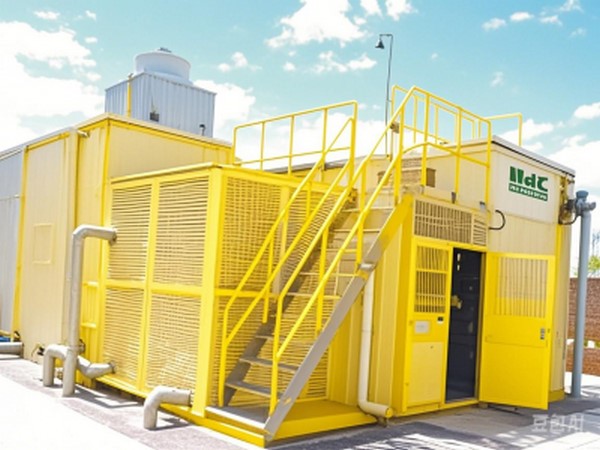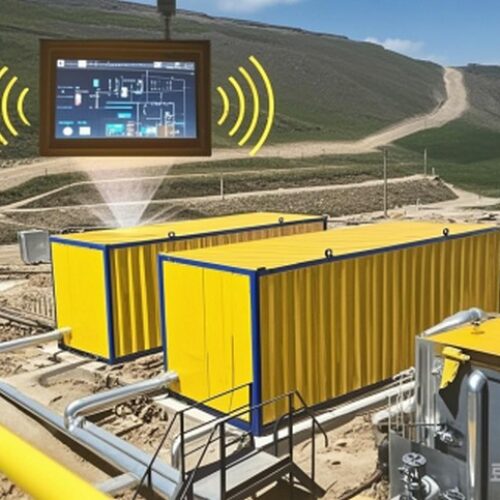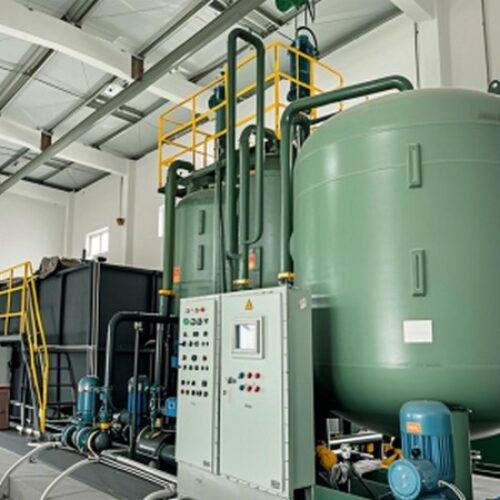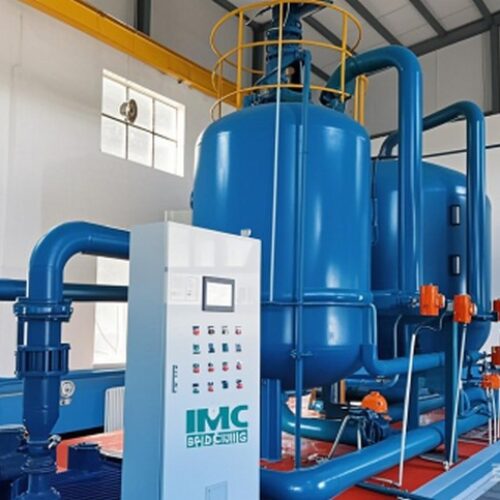Deskripsi
Overview of Intelligent Produced Water Treatment Systems (Biochemical + Fine Filtration):
Intelligent produced water treatment systems integrate biochemical treatment and fine filtration technologies to remove organic contaminants, suspended solids, and other impurities from produced water. These systems are equipped with advanced monitoring and control features to optimize performance, reduce operational costs, and ensure consistent water quality.
Key Components:
An intelligent produced water treatment system typically includes the following components:
1. Pretreatment Unit:
- Removes large solids, oil, and grease from the produced water.
- Common technologies include gravity separators, hydrocyclones, or coarse filters.
2. Biochemical Treatment Unit:
- Utilizes microorganisms to break down organic contaminants (e.g., hydrocarbons, dissolved organic compounds).
- Common technologies include:
-
- Aerobic Bioreactors: Use oxygen and bacteria to degrade organic matter.
- Anaerobic Bioreactors: Operate in oxygen-free environments to treat high-strength organic waste.
- Biofilters: Use biofilm-coated media to enhance microbial activity.
3. Fine Filtration Unit:
- Removes residual suspended solids and fine particles.
- Common technologies include:
-
- Media Filters: Use sand, activated carbon, or other media to trap particles.
- Membrane Filters: Use ultrafiltration (UF) or microfiltration (MF) membranes for high-efficiency removal.
4. Chemical Dosing System:
- Automatically injects chemicals (e.g., coagulants, flocculants, biocides) to enhance treatment efficiency.
- Equipped with precision dosing pumps and a control system.
5. Disinfection Unit:
- Uses UV sterilization, ozone, or chlorination to eliminate bacteria and pathogens.
6. Control and Monitoring System:
- Features sensors, flow meters, and online analyzers to monitor water quality parameters (e.g., pH, turbidity, TDS, oil content).
- Utilizes PLC (Programmable Logic Controller) or SCADA (Supervisory Control and Data Acquisition) systems for real-time data analysis and automated control.
7. Sludge Handling Unit:
- Collects and treats sludge generated during the treatment process.
- May include a sludge dewatering system for volume reduction.
Working Principle:
The intelligent produced water treatment system operates as follows:
- Pretreatment: Produced water undergoes initial separation to remove large solids and free oil.
- Biochemical Treatment: Microorganisms break down organic contaminants in aerobic or anaerobic bioreactors.
- Fine Filtration: Residual suspended solids and fine particles are removed using media or membrane filters.
- Chemical Treatment: Chemicals are dosed to enhance coagulation, flocculation, or disinfection.
- Disinfection: Treated water is disinfected to ensure it is free from harmful microorganisms.
- Monitoring and Control: The system continuously monitors water quality and adjusts operations in real time to maintain optimal performance.
Applications in Oil and Gas Field Water Treatment:
Intelligent produced water treatment systems are used for:
- Produced Water Treatment: Treating water extracted during oil and gas production to meet discharge or reuse standards.
- Water Injection: Preparing water for reinjection into reservoirs to maintain pressure and enhance oil recovery.
- Wastewater Recycling: Enabling the reuse of treated water for industrial or agricultural purposes.
Advantages:
- High Treatment Efficiency: Combines biochemical and filtration processes to achieve superior water quality.
- Automation: Reduces manual intervention and ensures consistent performance.
- Real-Time Monitoring: Provides continuous data for proactive decision-making and optimization.
- Environmental Compliance: Ensures treated water meets regulatory standards for discharge or reuse.
- Cost-Effective: Reduces operational and maintenance costs through automation and efficient resource use.
- Compact Design: Saves space and allows for easy installation and expansion.
Challenges:
- High Initial Investment: Requires significant upfront capital for advanced technologies and automation.
- Complex Maintenance: Requires skilled personnel for maintenance and troubleshooting.
- Adaptability: May need customization to handle varying water quality and flow rates.
7. Summary:
Intelligent produced water treatment systems combining biochemical processes and fine filtration are state-of-the-art solutions for oil and gas field water treatment. They integrate advanced technologies, automation, and real-time monitoring to deliver efficient, reliable, and environmentally compliant water treatment. Their compact design and versatility make them ideal for addressing the complex challenges of produced water management in the oil and gas industry





Ulasan
Belum ada ulasan.